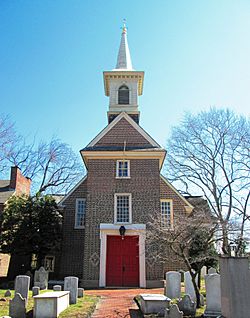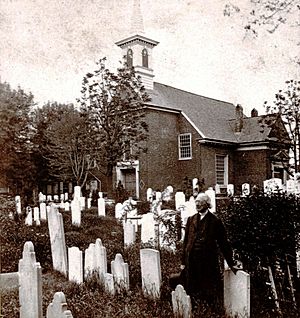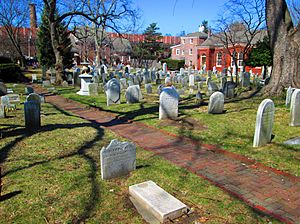Gloria Dei (Old Swedes') Church facts for kids
|
Gloria Dei (Old Swedes') Church
National Historic Site |
|

(2014)
|
|
| Location | 929 South Water Street Philadelphia, Pennsylvania |
|---|---|
| Area | 3.7 acres (1.5 ha) |
| Built | 1678–1700 additions: 1703, c. 1733 |
| Architectural style | English vernacular |
| Website | Official site: http://www.old-swedes.org |
| NRHP reference No. | 66000682 |
Quick facts for kids Significant dates |
|
| Added to NRHP | October 15, 1966 |
Gloria Dei Church, known locally as Old Swedes', is a historic church located in the Southwark neighborhood of Philadelphia, Pennsylvania, at 929 South Water Street, bounded by Christian Street on the north, South Christopher Columbus Boulevard (formerly Delaware Street) on the east, and Washington Avenue on the south. It was built between 1698 and 1700, making it the oldest church in Pennsylvania and second oldest Swedish church in the United States after Holy Trinity Church (Old Swedes) in Wilmington, Delaware.
The carpenters for the building were John Smart and John Buett and bricks were supplied by Richard Cantril. The church displays the English vernacular style of church design, which combines elements of the Medieval and Gothic styles. The church's vestry and entranceway were added in 1703 to buttress the walls, which had begun to buckle under the weight of the roof. The tower was added c.1733, and interior alterations were made in 1845, designed by Samuel Sloan.
The congregation dates to 1677, five years before the founding of the city of Philadelphia, and the graveyard around the church to about the same time. Formerly a Swedish Lutheran congregation, the church has been Episcopalian since 1845.
History
Gloria Dei is the oldest church in Pennsylvania and second oldest Swedish church in the United States after Holy Trinity Church (Old Swedes) in Wilmington, Delaware. Swedish pioneers of New Sweden were the first to settle the area in 1646. An existing blockhouse at Wicaco (now South Philadelphia), had been renovated for worship in 1677 and was used until the present church (built beginning in 1697) was consecrated on the First Sunday after Trinity, July 2, 1700. A fire destroyed many of the church records in 1740. Colonial painter Gustavus Hesselius was a member here.
In 1703, Gloria Dei was the site of the first regular Lutheran ordination in the Americas, that of Justus Falckner, a German theology student. Jenny Lind sang here during one of her American tours. Hanging in the center aisle is a Swedish chandelier given by famous Swedish artist Carl Milles. Recollections of many Swedish royal and episcopal visits are treasured memories, including models of Fogel Grip and Kalmar Nyckel, the first Swedish ships to arrive in New Sweden.
The church has a collection of historical and religious artifacts the church has acquired over three centuries, including bronze crosses and 18th century Bibles in Swedish and English. In 1845, the formerly Swedish Lutheran congregation joined the Episcopal Church. Today the church is owned and maintained by its congregation of Episcopalians.
The church was designated a National Historic Site on November 17, 1942. It is an affiliated area of the National Park Service under Independence National Historical Park. The church site is owned and administered by the Corporation of Gloria Dei (Old Swedes') Church. It was listed on the National Register of Historic Places on October 15, 1966.
Cemetery
The church cemetery includes the following interments:
- Sven Gunnarsson (d. 1678), one of the first buried at the church, a founding father of the New Sweden colony.
- John C. Hunterson (1841-1927), Civil War soldier and Medal of Honor recipient (issued August 2, 1897).
- William Irvine (1741–1804), Revolutionary War officer and physician.
- George Ord, Sr. (d. 1806), Revolutionary War adventurer, sea captain.
- George Ord, Jr. (1781–1866), ornithologist.
- James Peale (1749–1831), Revolutionary War officer and artist (brother of Charles Willson Peale).
- Sarah Miriam Peale (1800–1885) portrait painter, daughter of James Peale.
- Alexander Wilson (1766–1813), ornithologist and illustrator.
- Amandus Johnson (1877–1974), Swedish-American scholar and founder of the American Swedish Historical Museum.
- Peter Gunnarsson Rambo (1611–1698), Swedish immigrant who became known as the Father of New Sweden.
- Richard Cantril (1666-1753), brickmaker, supplied bricks and assisted in building of the church
There is also a memorial to John Hanson, a President of the Continental Congress during the American Revolution.
Images for kids
-
Floor plans of the first floor and balcony
-
WPA poster promoting the church as a Philadelphia destination













